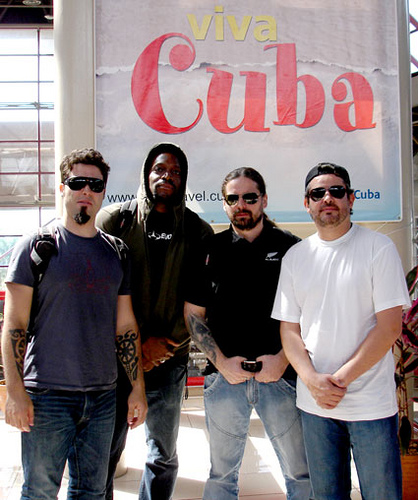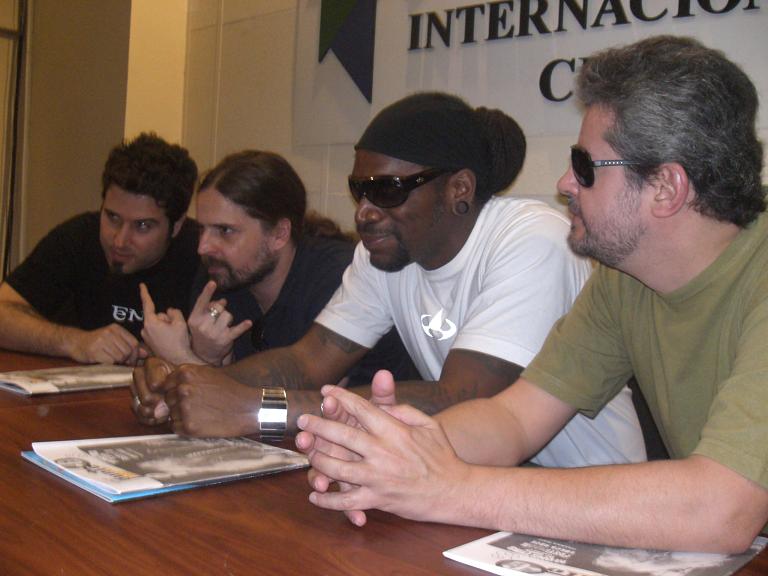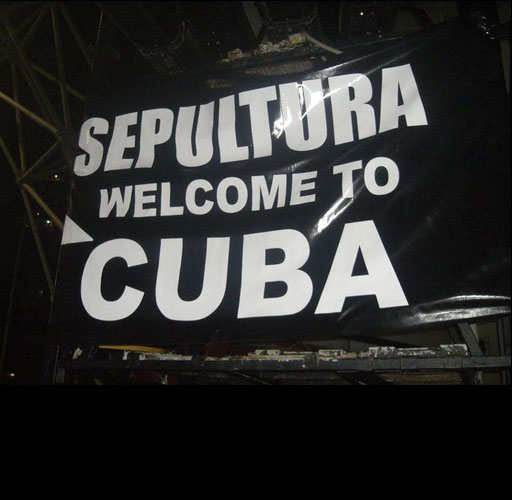I jumped with joy when I heard Sepultura were coming over to play a concert in Cuba. Not that I am a thrash metal fan, but I am aware that, whether you are from Belo Horizonte, Brazil or not, they are one of the most acclaimed metal bands in the world. Even when rock music was banned in Cuba in the ‘60s and ‘70s because it was then considered too capitalist and not a "good example for the formation of social values in the Cuban youth", the local authorities have now changed their minds and are more open and supportive.
The first foreign acts to play Cuba after Fidel Castro and his fellow guerillas overthrew the Batista dictatorship in 1959 were Billy Joel, Rita Coolidge and Weather Report. This was 1979, twenty years after Cuba became a Marxist-Leninist regime. It was a sort of three-day cultural interchange where several Cuban musicians, from bolero singers to cha-cha-chá acts, shared the bill with their rockier American counterparts. Not many local rock fans had the chance to see it – or even found out it ever happened. The show was only by invitation, mostly for Cuban officials and very special guests. Something similar happened again in 1999, exactly twenty years later, when US songwriter and producer Alan Roy Scott organized another interchange event called Music Bridges with musicians of the likes of Peter Frampton, Andy Summers, Mick Fleetwood, Burt Bacharach, Stewart Copeland, Don Was, Bonnie Raitt, Peter Buck, Gladys Knight, amongst others, who teamed up with Cuban songwriters, musicians and producers, writing new songs that they would later play. Again this was by invitation only, for five thousand officials and very special guests.

Is rock and roll alive in Cuba? Well, with a few hurdles along the way, of course it is. Many foreign friends have asked me what it will be like when the Castros die. Well, to tell you the truth, I hate to mix politics with culture, but I guess this can be easily answered in a single paragraph.
First of all, Cuba has only one political group: the Communist Party, which runs the nation. And almost everything in Cuba is government-run and government-owned. Of course there is dissent and opposition, but even when this is not illegal, they don’t have any power or effect in the socio-political development of the country. Until a few months ago, Fidel Castro was the President of the Council of State and Ministers, the President of the Republic of Cuba, and the First Secretary of the Central Committee of the Communist Party of Cuba. Now his brother Raúl is in charge of the Presidency but Fidel still runs the Communist Party. The succession of power from one brother to another hasn’t meant any political change to the island, although some social changes are currently taking place. And even when time comes for Raúl to cede power, everything will undoubtedly remain within the confines of the Communist Party.
So what will happen when the Castros go? Simple answer: nada.
But the Cuban government, especially the Ministry of Culture and its music branch, the Cuban Institute of Music, have been very open to rock and rock lately. I know first-hand because, even when I’m freelance and don’t work directly for the government, I have been involved, to a bigger or lesser extent, in almost every rock project that has taken place in Havana in the last fifteen years. I started organizing the Beatles Conventions in 1996 and managed to bring John Lennon’s original Quarrymen (minus some key members) over two years later. I graduated to producing or helping produce gigs by foreign acts such as the Manic Street Preachers, Asian Dub Foundation, Sir George Martin directing Cuba’s National Symphony Orchestra, Audioslave, Rick Wakeman, Air Supply, Simply Red . . . and now Sepultura.
The authorities, though sometimes very bureaucratic, are usually supportive. It’s true that sometimes it’s very hard to get a concert organized, or the promotion on radio and television runs badly, but that’s mostly due to a bunch of idiots with power in the cultural world who really don’t give a damn about rock & roll. I once interviewed a high-ranking official after he had turned up at a concert by Dimension Vertical, a veteran rock and roll band, in a club in downtown Havana, and had demanded to turn the band’s power off because, according to him, they were playing “the music of the enemy.” And this wasn’t 1963, the year following the Missile Crisis and the US economic, commercial and financial embargo imposed on Cuba by the US, when there was a lot of political tension between Washington and Havana, and almost anything having to do with the English language was considered American, including the Beatles of course.
This guy, a member of the Communist Party, still saw the evil of rock and roll in 2003.
Was this official acting on behalf of Fidel Castro? I seriously doubt it. I’m sure this guy didn’t even know that three years earlier Castro himself had unveiled a statue of John Lennon in a Havana park and had publicly acknowledged it had been a mistake to ban rock music and the Beatles in Cuba. "What would you tell John Lennon if you met him now?" asked a journalist after the dedication. Castro replied: "What would I tell him? I’m sorry I didn’t meet you before."
So rock & roll is very much welcome in Cuba. I’m pretty sure that every foreign rock band wanting to come and play Havana would surely get the immediate government’s attention, no matter if they played political rock or not. The Manic Street Preachers are political. Sepultura aren’t. Every foreign act playing in Cuba will certainly guarantee a full house. But be aware, every foreign act playing in Cuba will have to play for free. Think of bringing a film crew along for a future DVD or something. There’s no other way of making money out of a concert in Havana.

I attend the actual gig with my eleven-year-old son Dhani. The Cuban Institute of Music has predicted 70 thousand rock fans, about the same amount that turned up for the Audioslave in 2005. But as I approach the venue, I soon realize Sepultura won’t even reach the 30-thousand mark. With a lot of effort and a few heavy pushes, I manage to pass the tight police security at the left of the stage. I have a VIP pass that allows me to get as close to the stage as I want, which I happily do, ready to take loads of close-ups of the band. Huge mistake. Little do I know that when ‘Darkwood,’ their first song, explodes out of the amps, then so will my ears.
We are standing in front of a row of amps at floor level. My son, who plays the violin at a Havana conservatoire and has very sensitive ears, looks at me with disbelief: "THIS IS FAR TOO LOUD!" he cries out when Derrick takes a break between verses. "I CAN’T STAND THE NOISE." We move back as much as possible but realise we are trapped in the enclosed VIP area, and no matter how far you want to move away, you cannot escape the 50,000 watt reach that hits your body like a sledgehammer.
It is funny, because their set list matches the course of events that follow. ‘Refuse/Resist’ makes us wonder which we should do. But we do resist the temptation to leave even when ‘Convicted In Life,’ their third song, is suddenly greeted by a heavy shower caused by one of the rainbands from tropical storm Dolly, which is slowly moving across the Mexican Gulf towards Texas. ‘False’ follows, and then ‘D.E.C.’, and then ‘Ostia’. But my son’s ears can’t stand any more. And neither can mine. So we decide to call it quits even though the concert isn’t even halfway over. As we walk away from the VIP area, it starts to pour again, very heavily this time, and flocks of fans around us rampage for shelter as Derrick sings, as if on cue, ‘Desperate Cry/Escape.’
We didn’t see the rest of the show. From experience, now I know that I can happily donate my VIP pass to my hardcore groove metal, thrash metal, death metal and black metal neighbor Pavel if Sepultura, or any other colleague of the sort, ever comes to play Cuba again.




